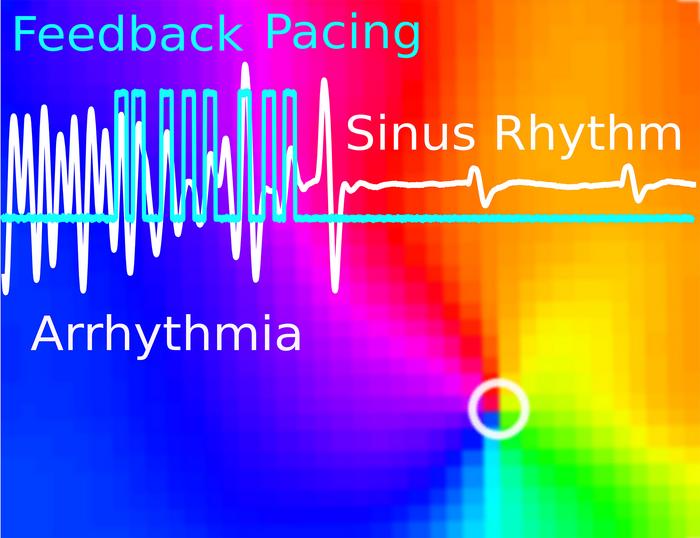Cardiac arrhythmias account for around 15-20% of annual deaths worldwide. In case of acute and life-threatening arrhythmias, defibrillators can be used to restart the regular beating of the heart. A strong electrical pulse brings cardiac activity to a brief standstill before it can be resumed in an orderly way. Whereas this treatment can save lives very effectively, the strong electrical pulses can also have negative side effects such as damage of the heart tissue or strong pain.

Credit: © MPI-DS, Biomedical Physics Group
Cardiac arrhythmias account for around 15-20% of annual deaths worldwide. In case of acute and life-threatening arrhythmias, defibrillators can be used to restart the regular beating of the heart. A strong electrical pulse brings cardiac activity to a brief standstill before it can be resumed in an orderly way. Whereas this treatment can save lives very effectively, the strong electrical pulses can also have negative side effects such as damage of the heart tissue or strong pain.
“We developed a new and much milder method which allows the heart to get back into the right rhythm,” says Stefan Luther, Max Planck Research Group leader at the MPI-DS and professor the University Göttingen Medical Center. “Our results show that it is possible to control the cardiac system with much lower energy intensity,” he continues.
To test their method, the scientists used genetically modified mouse hearts that can be stimulated by light. In this setting, a sequence of optical light pulses is triggered using a closed-loop pacing algorithm. Each pulse is triggered in response to the measured arrhythmic activity. With this pacing protocol, the team was able to effectively control and terminate cardiac arrhythmias even at low energy intensities that do not activate the heart, but only modulate its excitability.
“Instead of administering a single high-energy shock to restore normal heart rhythm, we use our understanding of the dynamics of cardiac arrhythmias to gently terminate them.” explains Sayedeh Hussaini, first author of the study. “This results in a subtle treatment method with far less energy per pulse, more than 40 times less compared to the conventional strategy” she reports.
The research team will also use these findings to improve the control of arrhythmias using electrical pulses. This may result in advanced defibrillators causing less pain and side-effects for patients.
Journal
Chaos An Interdisciplinary Journal of Nonlinear Science
Method of Research
Experimental study
Subject of Research
Animal tissue samples
Article Title
Efficient termination of cardiac arrhythmias using optogenetic resonant feedback pacing
Article Publication Date
25-Mar-2024



